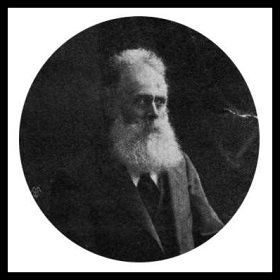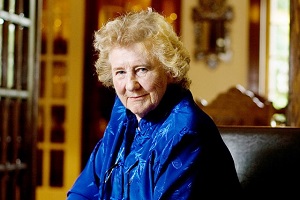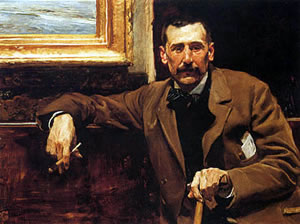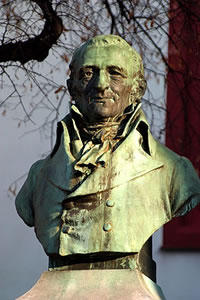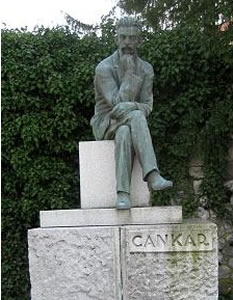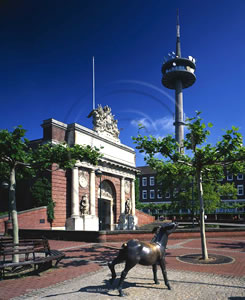De Amerikaanse dichteres en performster Jayne Cortez werd geboren op 10 mei 1936 in Fort Huachuca, Arizona. Zie ook alle tags voor Jayne Cortez op dit blog.
Don’t Ask/1980
Don’t ask me
who I’m speaking for
who I’m talking to
why I’m doing what I do in
the light of my existence
You rise you spit you brush you drink you
pee you shit you walk you run you work
you eat you belch you sleep you dream &
that’s the way it is
In the morning
tap water tasted fishy
coffee sits in its
decaffeinated cup
caca & incense
have a floating romance
& a stale washcloth
will make you smell
doubly stale
so don’t get kissed on the cheek
don’t get licked on the neck
at 8 a.m.
the trains & buses are
packed with folks farting
their bread & butter farts
the gymnasium
is dominated
by the stench of
hot tennis shoes
& one in the locker room
a few silly-talking
intellectual-looking
coke-drinking
cloth-dropping
paper-littering
spinach-pooting
smug arrogant women wait to
be waited on
& in another locker room
there are odors of
crotches & jock straps
bengay, tiger balm
& burning balls
sweat socks & sweat suits
of body-building
door-slamming
iron-pumping
phlegm-hawking men
all sour & steamy
& wrapped up together
in a swamp of
butt-popping towels
but don’t let it
get you down
don’t let it
psych you up
Outside the ledges are
loaded with pigeons
clouds are seeded with
homeless people &
lyricism of the afternoon
in a sub-proletarian madman
squatting & vomiting
from his bowels
a brown liquid of death
in front of your house
& it’s not happening because of you
those socks don’t stink because of me
a bureaucrat is not a jerk because of us
I’m not this way because of them
you’re not that way because of me
don’t ask about influences
You rise you spit you brush you drink you
pee you shit you walk you run you work
you eat you belch you sleep you dream
& that’s the way it is
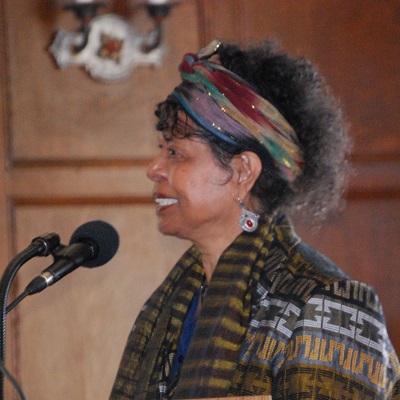
De Engelse schrijfster Barbara Taylor Bradford werd geboren in Leeds, West Yorkshire op 10 mei 1933. Zie ook alle tags voor Barbara Taylor Bradford op dit blog.
Uit: The Cavendon Luck
“Cecily Swann Ingham stood on the outside steps of the office annexe at Cavendon Hall, glancing around. What a change in the weather, she thought. From a gloomy, overcast morning it had become a radiant afternoon. Blue sky. No clouds. Brilliant sunlight filtering through the leafy trees. A perfect day in late July. A smile of pleasure touched her face fleetingly. Walking down the steps and crossing the stable yard, she headed for the dirt path through Cavendon Park which led to Little Skell village. Cecily thought suddenly of her son’s birthday earlier in the month as she strode ahead. It had poured with rain that day and spoiled their plans for the garden party. The celebration was held indoors in the end. She couldn’t help wishing it had been a glorious day like this. On the other hand, David hadn’t minded about the weather. It was his ninth birthday and he had enjoyed every moment, as had his brother, seven-year-old Walter, and their sister Venetia, who was five. It had been a happy time for the family, and that was what counted most; their enjoyment derived from the festivities, and what Miles always called the ‘gathering of the clan’. Later that night when they were in bed, Miles had drawn her closer to him, and had wondered out loud where all the years had gone. She had said she didn’t know and had reminded him that time always flew when they were together. He had laughed and pulled her even closer, stroking her hair. After a moment, she had added that they had been busy raising three children, going about their own business and keeping Cavendon safe. She recalled how he had murmured his thanks for all that, had wrapped his arms around her, then slipped on top of her, kissing her, touching her tenderly. Within seconds they were making love to each other with the same excitement and joyousness they had always known. Suddenly, remembering that night so clearly, she couldn’t help wondering if he had made her pregnant on their son’s ninth birthday? They had both been so eager for each other, and intense. It had been a passionate night.”
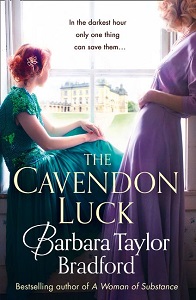
Cover
De Spaanse schrijver Benito Pérez Galdós werd geboren in Las Palmas op 10 mei 1843. Zie ook alle tags voor Benito Pérez Galdós op dit blog.
Uit: Tormento (Vertaald door Frans Oosterholt)
“Hoek van las Descalzas. Twee figuren, de helft van hun gezicht in een sjaal gehuld, die vanuit tegenovergestelde richtingen het toneel opkomen, lopen tegen elkaar op. Het is avond.
Eerste gemaskerde: ‘Pummel!’
Tweede gemaskerde: ‘Een pummel, dat bent u zelf.’
Eerste gemaskerde: ‘Ziet u de weg soms niet?’
Tweede gemaskerde: ‘En heeft u geen ogen in uw hoofd? U loopt me zowat ondersteboven.’
Eerste gemaskerde: ‘Ik loop hier gewoon.’
Tweede gemaskerde: ‘En ik ook.’
Eerste gemaskerde: ‘Als ik je te pakken krijg, jongetje…’ (Hij houdt hem tegen)
Tweede gemaskerde: ‘Wat een figuur!’
Eerste gemaskerde: ‘Als ik je te pakken krijg, jongetje… (Hij blijft dreigend staan), zal ik
je leren hoe je tegen oudere mensen moet praten! (Hij neemt de tweede gemaskerde aandachtig op) Maar ik ken dat gezicht. Verdorie nog aan toe!… Ben jij niet?…’
Tweede gemaskerde: ‘En ik ken u ook. Dat gezicht, dat is óf van de duivel, óf van don José Ido de Sagrario.’
Eerste gemaskerde: ‘Mijn teerbeminde Felipe! (Hij laat zijn sjaal zakken en opent zijn armen) Wie zou je achter die sjaal hebben herkend? Je bent Aristoteles in hoogsteigen persoon. Omhels me nog een keer… nog een keer!’
Tweede gemaskerde: ‘Wat een ontmoeting! Gelooft u me, don José: ‘ik ben nog blijer om u te zien dan als ik een zak vol met geld zou hebben gevonden.’
Eerste gemaskerde: ‘Maar waar hang je uit, knul? Hoe staat het leven?’
Tweede gemaskerde: ‘Dat is een heel verhaal. En u, wat doet u?’
Eerste gemaskerde: ‘Oef!… Laat me even op adem komen. Heb je haast?’
Tweede gemaskerde: ‘Niet erg.’
Eerste gemaskerde: ‘Dan praten we even wat bij. Het is fris vanavond, en het is nergens voor nodig om op dit kale pleintje een boom op te zetten. Laten we naar café Lepanto gaan, dat is hier niet ver vandaan. Ik trakteer.”
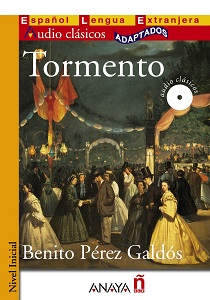
Cover Spaans luisterboek
De Sloveense schrijver, dichter en toneelschrijver. Ivan Cankar werd geboren in Vrhnika op 10 mei 1876. Zie ook alle tags voor Ivan Cankar op dit blog.
Uit: On the Slope (Vertaald door Urška Charney)
„Francka couldn’t fall asleep late into the night. All was already silent, nothing stirred in the dark, and she was almost afraid. Very seldom a curt voice cut through the night – a young fellow in the village exulted in life, he sang a song. As he treaded down the slope, the song grew voiceless and it sank into the night. At the shopkeeper’s a dog barked away – he had heard god knows what, a rustling of a vicinal chestnut, a mouse’s scratch in the shop, a young fellow’s distant song, and so he raised his h
ead and howled with a tight, squealing voice, then half-asleep he wailed once again and lay down on the tilt into slumber …
Francka was covered with only a sheet, yet she felt hot and her forehead ran sweat onto her cheeks wetting the pillow beneath. The chamber was robed in darkness. The air was heavy and hot. She felt it would have cooled down had she uncovered the green curtain on the window and let the night skies’ soft light break free into the chamber. Out of the darkness came the steady, weary wheeze of Mother and sister, who slept in their beds, and every once in a while a big wall clock’s tick pierced through, its droning sound suppressing all the rest, and then again it vanished as if the clock had ceased to live.
Francka almost sank into slumber, but suddenly shefelt as though she had been sliding downwards little by little, as if the chest on which she slept had been tilting, tilting … she woke up, startled. Her mind was imbued with joyous and strange thoughts. Air, abounding with beautiful memories and hopes, loafed around the chest – lively, smiling faces, kind people dressed in their Sunday best.
As she was listening to Mother’s and sister’s arduous wheezing, her heart shuddered. She felt she was devoid of love for her Mother and sister, and that was a sin. They slept peacefully, a graceful godly sleep, their eyes shut, their lips open only a little, their cheeks burning hot – and if there had been light, Francka would have gotten up and tiptoed to the bed and leaned over them and tears would have come into her eyes.“
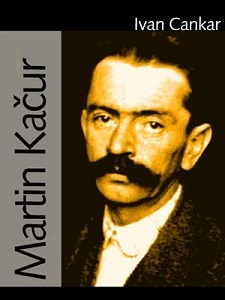
Cover biografie
De Duitse dichter Martin Boelitz werd geboren op 10 mei 1874 in Wesel. Vanaf 1902 leidde hij de uitgeverij Nieter in Nürnberg. Zie ook alle tags voor Martin Boelitz op dit blog.
Bal paré
Wirf doch die Rosen fort, Marie!
Lass doch die bunten Sommerranken,
Tanzt ja heute mit zitterndem Knie,
Liebste, ich will dir’s danken!
Weit im Park steht ein stilles Haus –
Horch! die Rappen stampfen am Wagen,
Komm, der Lärm ist nicht zu ertragen,
Komm, ich führ’ dich hinaus.
So, hier ist’s still, und nun bist du mein,
Lass nur den Arm um den Leib mich legen,
Trankst wohl wenig vom roten Wein?
Ich aber, ich dagegen!
Ach, der Wein war so schal und trüb’, –
Mädel, musst nicht an gestern denken,
Hunde und Pferde will ich dir schenken,
Dann aber hab’ mich lieb!
Lustig, Marie, so lache doch, Kind!
Morgen gehst du in Samt und Seide,
Sieh, wo die leuchtenden Fenster sind,
Sorgt man jetzt um uns beide.
Fürchtest dich wohl, du junges Blut,
Wärst wohl lieber ins Dorf gegangen?
Brauchst dich nicht schämen, brauchst nicht zu bangen,
Schatz, ich bin dir ja gut!
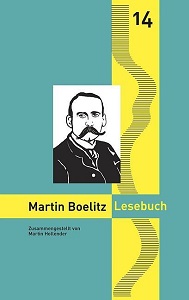
Cover
De Amerikaanse schrijfster Ariel Durant (eig, Chaya Kaufman) werd geboren op 10 mei 1898 in Proskoeriv, tegenwoordigChmelnytsky in de Oekraïne. Zie ook alle tags voor Ariel Durant op dit blog..
Uit: Napoleon (Samen met Will Durant)
“There is no such agreement about the imperial stomach. “In all my life,” he told Las Cases on September 16, 1816, “I never had either a headache or a pain in my stomach.” Meneval corroborated him: “I have never heard him complain of pain in the stomach.” However, Bourrienne reported having more than once seen Napoleon suffering such stomach pains that “I would then accompany him to his bedchamber, and have often been obliged to support him.” In Warsaw, in 1806, after violent stomach pains, he predicted that he would die of the same disease as his father – i.e., cancer of the stomach. The doctors who performed an autopsy on him in 1821 agreed that he had a diseased – apparently a cancerous – stomach. Some students would add gonorrhea and syphilis to his woes, and suggest that some by-products remained with him to the end.
He refused to treat his ailments with medicine. As a general accustomed to wounded soldiers, he admitted the need of surgery; but as for drugs, he distrusted their side effects, and preferred, when ill, to fast, drink barley water, lemonade, or water containing orange leaves, to take vigorous exercise to promote perspiration, and let the body heal itself. “Up to 1816,” Las Cases reported, “the Emperor did not recollect having ever taken medicine”; but the imperial memory was then susceptible to wishful forgetting. “Doctor,” he explained to the physician of the S.S. Northumberland on the way to St. Helena, “our body is a machine for the purpose of life; it is organized to that end – that is its nature. Leave the life there at its ease; let it take care of itself; it will do better than if you paralyze it by loading it with medicines.” He never tired of teasing his favorite physician, Corvisart, about the uselessness of medicine; finally he led him to agree that, all in all, drugs had done more harm than good. He amused his final physician, Francesco Antommarchi, by asking him which of the two groups, the generals or the doctors, would, at the Last Judgment, be found responsible for the greater number of deaths.”
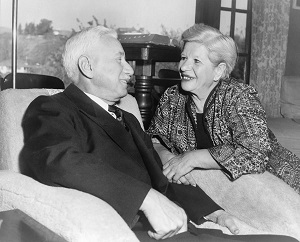
Will en Ariel Durant
De Duitse schrijver Fritz von Unruh werd geboren op 10 mei 1885 in Koblenz. Zie ook alle tags voor Fritz von Unruh op dit blog.
Uit: Opfergang
“In letzten Januartagen wurden wir verladen, feindlicher Flieger wegen bei Nacht. Niemand wußte wohin. Unser Vizefeldwebel, Lehrer Clemens, sprach zwar bedenklich: »Das geht auf Verdun«, aber wir gaben nichts darauf. Un-bekanntem drängten Blut und Eisenbahn zu. Tambour-gefreiter Preis, det galt, weil er einmal von den Füßen seines Hauptmanns französische Handgranaten geistgegenwärtig aufgerissen und feindgeschleudert hatte, rief über strunkige Rübenfelder zurück: »Du Mausefalle und Rattengewirr! verfluchter Schützengraben, Nordfrankreich, adel Meine Nase zieht mich gen Süden!« — »Nach Ägypten!« rief Heinz, der Kriegsfreiwillige, und schwenkte die Mütze. Auf die Schulter schlug ihn der Trommler: »Willst Du den Sonnen-stich ? Mir summt’s im Ohr: 0 Straßburg, o Straßburg …« und die anderen fielen ein: »Du wunderschöne Stadt.« Ge-sang wuchs und trug in Begeisterungshöhen. Sergeant Hillbrand, des Lehrers Freund und Kollege, schüttelte den Kopf. Eine Karte an das kuglige Glas der Deckenlampe haltend, sagte er, Einwand verbittend: »Da liegen die Ar-gonnen, dort zittert Paris«, und stemmte sich in wuchtiger Gestalt gegen die Wände. Ober unsere Beine stieg er ans Fenster und sah aus dem Wagen. Vize Clemens’ fragende Augen folgten ihm scheu; wie warnend behielt er seinen Zeigefinger scharf, langsam in Bewegung. Singend griff ihn der Trommler: »Was gibt’s, Professor ?« Seufzendes Gegenwort: »Jungens, Jungens!« »Schwarzseher?« Scher-zende Gefreitenfäuste sausten nieder. Clemens lachte unter Schmerzen auf, aber der Trommler rief: »Wir wollen Generalmarsch! Meuine Trommel, die Welt! Ihr Tambour bin ich!“
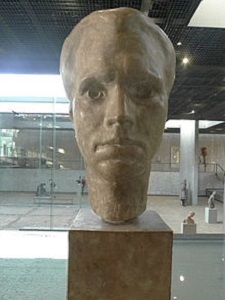
Portretbeeld door Wilhelm Lehmbruck, 1918
De Vlaamse schrijver en dichter Leonard Buyst (ook wel Léonard) werd geboren in Lokeren op 10 mei 1847. Zie ook alle tags voor Leonard Buyst op dit blog.
Uit: Licht en schaduw, gedichten van Leonard Buyst (Bespreking in Het Belfort, 1888)
“De dichter is ons geen onbekende meer, vroeger reeds hebben wij met hem kennis gemaakt in Het Belfort als wij zijne novelle Mina Lievens bespraken. Met geluk bestatigen wij dat hij op den rechten kunstweg is, dat hij gewetensvol gewaakt en gewerkt heeft en dat zijn Licht en schaduw zoo ver boven Mina Lievens is als het licht boven de schaduw. Deze bundel is aan M.J. Van Droogenbroek opgedragen.
Dankbaar groet hij zijnen eersten aanleider hem door de dood ontrukt en met dezelfde bewogen erkentenis wijdt hij de zangen zijner lier aan hem die Delcroix vervangen heeft en hem een meesterlijke meester is.
In het algemeen neemt deze bundel geene hooge vlucht doch hij verraadt hoedanigheden die veel beloven voor de toekomst. Men ziet dat de dichter het echte schoone wil en zoekt, dat hij dorst naar waar kunstgenot en dat hij ter bereiking van zijn doel zich geene moeite noch studie ontziet. Met aanhoudendheid, werkzaamheid en oprecht kunstgevoel bedeeld, komt men ver.
De verzenbouw is vloeiend en wel gemaakt, enkel hoeft de dichter zich te wapenen tegen zijne blanke verzen die soms mochten verloopen in proza. Dat hij zich ook steeds voor oogen houde dat poëzie beeldspraak is.
Zijne gedachten zijn edel, zijn streven verheven, zie zijne stukken Vertrouwen en Nachtegaal. In de Fabriek en De Grootvader toonen ons dat hij met meesterhand en innig gevoel de stille genoegens van den huiselijken haard weet weer te geven.”
